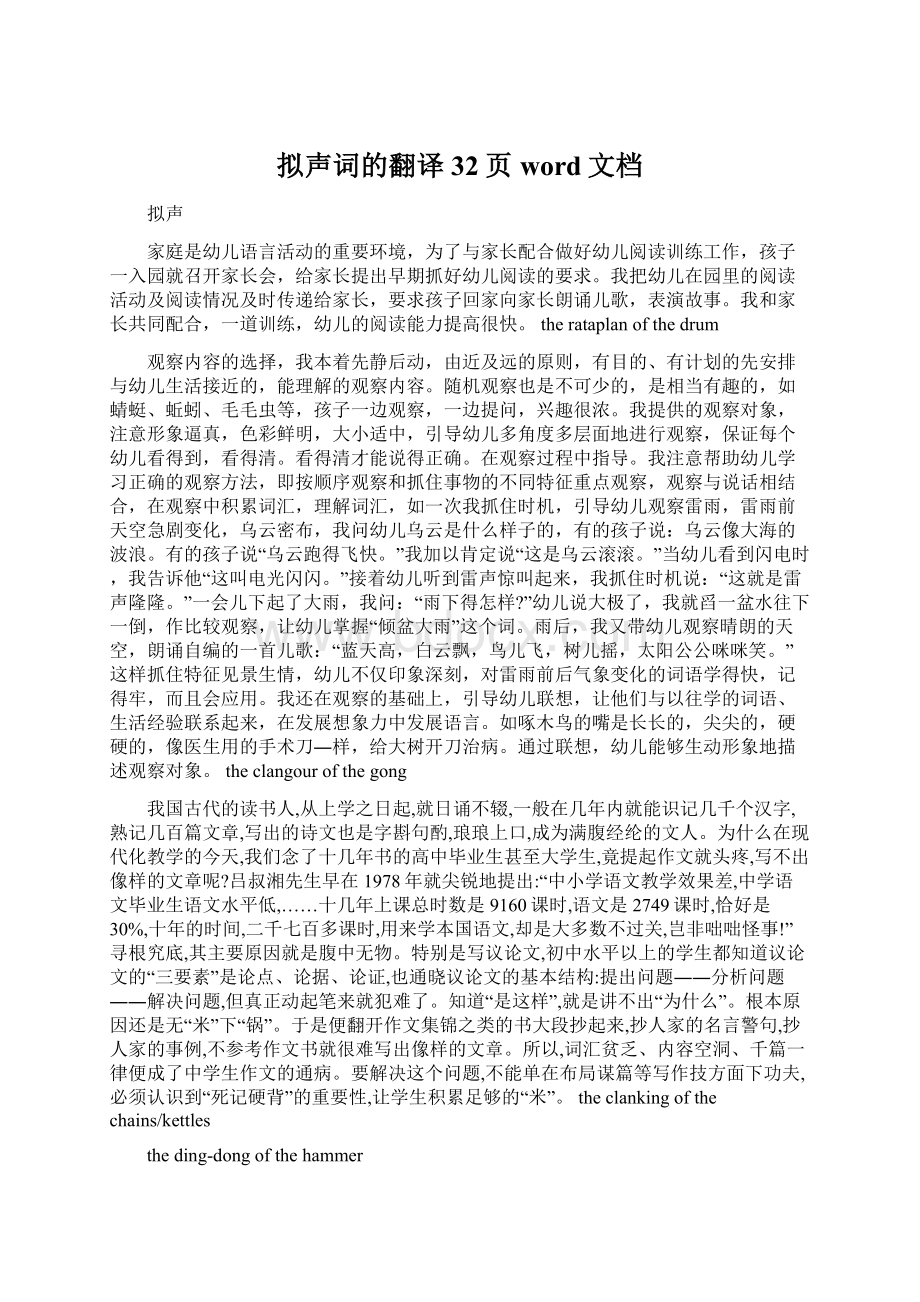拟声词的翻译32页word文档Word文件下载.docx
《拟声词的翻译32页word文档Word文件下载.docx》由会员分享,可在线阅读,更多相关《拟声词的翻译32页word文档Word文件下载.docx(10页珍藏版)》请在冰豆网上搜索。

”寻根究底,其主要原因就是腹中无物。
特别是写议论文,初中水平以上的学生都知道议论文的“三要素”是论点、论据、论证,也通晓议论文的基本结构:
提出问题――分析问题――解决问题,但真正动起笔来就犯难了。
知道“是这样”,就是讲不出“为什么”。
根本原因还是无“米”下“锅”。
于是便翻开作文集锦之类的书大段抄起来,抄人家的名言警句,抄人家的事例,不参考作文书就很难写出像样的文章。
所以,词汇贫乏、内容空洞、千篇一律便成了中学生作文的通病。
要解决这个问题,不能单在布局谋篇等写作技方面下功夫,必须认识到“死记硬背”的重要性,让学生积累足够的“米”。
theclankingofthechains/kettles
theding-dongofthehammer
theclashingoftheknives&
swords
thetick-tackoftheclock&
watch
thetinklingofthepiano
thetinklingofthephone
(thetinglingoftheglass)
thejinglingofthebells
thejanglingofthebicycle
thescreechingofthebrakes
thesqueakingoftheradio
thecreaking/rattlingofthehandcart
therumblingofthecart
therumblingofthetruck
(therumblingofthethunder)
(therumblingofthestomache)
(theboomingofartillery)
thebumpingofthevan
theclangingofthetram
&
trolley
thehummingofthesubway
thepuffingofthetrain
thetootingofthebugle&
horn&
trainwhistle
theshriekingofthesiren
(fire~/air-raid/ambulance)
thewhee-ee-eeofthepolicewhistles
thewhirringofthemachine
theclacking,rattlingofthemachines
theclatteringoftheautomotons
theclatteringofbowlsanddishes/knivesandforks
theclatteringofthehorse
theclip-clopofthehorse
thechatteringofamachine
amachinegun
thebangingofthedoor
theslammingofthedoor
thecrashingofthedoor
thecrashingoftheplane
thecrashingofthunderandlightning
thethwacking(whacking)onthedesk
thebangingofthefirecrackers
thecrackingofthefireworks
thecrackingoftheburningsticks
ther-ratchingofthematches
thesputteringofthesparks
therustlingoftheleaves
水等液体声
theripplingofthestream
thechatteringofthewater
thebubblingofthewater
(“splish-splosh”)
thesizzlingoftheliquid
asizzlinghotday
thedrip-dropofthewater
thesplashingoftherain
splashthroughthemire
squelchthroughthesnow
(“puchi-puchi”)
thesquashingofthewaterinthewetrainboots
人发出的各种声音
theclickingofthehigh-heeledshoes
theploppingoftheteardrops
thethuddingoftheheart
thethumpingonthechest
smacksb.Intheface
gurgledownthethroat
keeponclack-clack-clacking
whisperingandchattering
muttering/mur-muring
sneezing/snoring
thechattering/prattlingofthechildren
thewhoopsofjoy
(“hurrah”“hurray”)
(shout/yell/shriek/whistle)
chuckle抿嘴暗笑/咯咯叫
giggle咯咯傻笑
snicker/snigger
窃笑/马嘶鸣
sniff嗤之以鼻
snort“哼”
sneer讥笑
sputter唾液飞溅
sobbing/cryingofsadness
grunt/grumble/mumble
ofcomplaints
“Ouch”inthepain
各种动物叫声
Anassbrays.(hee-haws).
Abeehums.
(buzzes,drones).
Abirdtwitters.
(chirps,chirrups).
Abitternbooms.
Abullbellows(lows).
Acalfbleasts.
Acatmiaows.
(miaus,mews,purrs)
Achickcheeps.
(pips,peeps)
Acicadachirps/chirrups.
Acockcrows.
Acowmoos(lows).
Acranewhoops.
Acricketchirps/chirrups.
Acrowcaws(croaks).
Adeerbleats.
Adogbarks.
(yaps,yelps,bays,snarls,growls,howls)
Adonkeybrays(hee-haws).
Adovecoos.
Aduckquacks.
Anelephanttrumpets.
Aflyhums/buzzes/drones.
Afoxyelps.
Afrogcroaks.
Agoatbleats.
Agoosecackles(gaggles).
Ahencackles.
(chucks,chuckles,clucks)
Ahorseneighs.
(whinnies,nickers)
Alambbleats(baas).
Alionroars.
Amagpiechatters.
Amonkeyscreeches.
(chatters,gibbers,jabbers)
Amosquitohums/buzzes.
Amousesqueaks(peeps).
Anightingalejugs/jug-jugs
Anowlhoots(whoops).
Aparrotsquawks.
Apiggrunts(squeals).
Apigeoncoos.
Asheepbleats(bass).
Asnakehisses.
Asparrowtwitters(chirps)
Atigergrowls.
Aturkeygobbles.
Awhaleblows.
Awild-goosehonks.
Awolfhowls(growls).
TranslationofOnomatopoeia
英语拟声词多用做动词或名词,往往做谓语,主语,或宾语。
汉语拟声词多用做状语或与“……的一声”连用做状语,,或补语,多半带有形容词性质。
*句法的转换和调整,比较突出的是英语做谓语的动词和汉语做状语的副词之间的转化。
*英译汉时往往把原文中的拟声动词,名词,或动词派生词转译为汉语拟声动词附加语或拟声名词附加语。
1(谓语——状语)
“Nowaterleft,”hemuttered.
“没有水啦!
”他喃喃地说道。
2(谓语——补语)
Anorthwindiswhistling.
北风刮得呼呼的。
3(主语——独立成分)
Thenfollowedaloud“Clump!
Clump!
”asthecrookswentupthestairs.
蹬!
*蹬!
一阵楼梯板响,土匪们上楼了
4(介词宾语-——补语)
Thedishesandbowlsslid
togetherwithaclatter.
碟子,碗儿碰得叮叮当当的。
5Crack!
Thestickbrokeintwo.
喀嚓!
棒子断为两截。
6Crack!
Thelongivoryopium-pipebrokeintwo.
啪!
——一声响,那枝象牙烟枪断成两截。
7Twoheavygunswentoffinthewoods—Bump!
Bump!
两门重炮在森林里开始发射了——轰隆!
轰隆!
(直接翻译为独立成分)
8Butasthedoorbanged,sheseemedtocomebacktolifeagain.
可是当门砰地一声关上地时候,她好像又清醒过来了。
9Allwasquietandstillexceptforthedistanttinklingofapiano.
除了远处一架钢琴地叮当叮当声之外,万籁俱寂。
10RoundthecornerofCrescentBay,betweenthepile-upmassesofbrokenrock,aflockofsheepcamepattering.
沿着新月海湾的地方,从一堆堆破碎的岩石堆中,一群羊叭嗒叭嗒地跑了过来。
11Wines-cupsandchopstickswerelaidout,andadelicioussizzlingsoundcamefromthechafingdish.
杯筷陈设在个人面前,暖锅里发出滋滋的有味的声音。
12Alockrattledandtherewasaloudclankasthedoorofthenextcellwasflungopen
(翻译为形容词或副词,做定语)
隔壁牢房的铁锁响了一声,接着,传来推开铁门的哗啦啦的巨响。
13一个蚊子哼哼哼。
两个苍蝇嗡嗡翁。
Amosquitohumsandhums.
Twofliesdroneanddrone.
14车辚辚,马萧萧。
Chariotsrumbleandroll;
horseswhinnyandneigh.
(翻译为动词,做谓语)
OmittingofOnomatopoeia
........叫
......声
Thetrainwhistletooted.
火车汽笛拉响。
Iheardabirdchirpingamongtheflowers.
我听到一只鸟在花从中鸣叫。
Weheardthemachinewhir.
我们听到了机器声。
Thescreechingofthebreaksgotonmynerves.
刹车声刺激我的神经。
Themomentherushedin,thehenschuckedandthedogsbarked.
他一进门,鸡也鸣,狗也叫。
Thefrogsinthefieldsoutsidethetownwerecroakingcheerfully.
青蛙在城郊的田野里起劲地叫着。
Hefeltasifhemustshoutandsing,heseemedtohearabouthimtherustleofunceasingandinnumerablewings.
他感到简直要大喊大唱,耳际仿佛传来无数翅膀的拍击声。
*ThetrainpuffedtowardsTokyofromSendai.
火车从仙台开往东京。
AddingofOnomatopoeia
Hefellasleepalmostimmediately.
他倒头就呼呼睡啦。
Thetearsshecouldnotholdbackfellonhisface.
她那抑制不住的眼泪扑碌碌地落在他的脸上。
Thelogswereburningbrisklyinthefire.
木柴在火中哔哔剥剥烧得正旺。
Thekidsarecryingloudly.
孩子们在哇哇大哭。
“Impertinent!
”
snortedImalds.
伊梅尔达鼻子哼了声“没家教!
Thatoldmanwassuckingvigorouslyatapipe.
那老头在吧嗒吧哒地抽着一个烟袋。
IhadsighedwhenIfirstheardthelute,andnowIheardherstorywhichmadelament.
我闻琵琶已叹息,又闻此语重唧唧
***注意文化背景
值得注意的是,翻译时,要重视拟声词使用的文化差异。
汉语中.在大多数场合拟声词用于拟物时含有贬义色彩而英语中,拟声词用于拟物时.充分体现了作者对动物的情感倾向。
就bark一词而言,不了解英汉文化上的差异,势必导致对谚词的误解、误译。
在有些翻译文章中却常常把该词译为“像疯狗一样狂吠”,而英语国家的人在使用该词时没有任何贬义。
而在使用chatter一词时,具有强烈的贬义色彩,倒如:
thewomanalwayschattershersillytale。
chatter一词在此表示“叽叽喳喳”、“喋喋不休地说”。
再如,cricket(蟋蟀)及其叫声在汉语里常常使人们感觉萧疏凄清,这是因为蟋蟀是秋虫,自然会使人联想到“凄雨秋风”。
而英美人对cricket一词的感受却与我们截然不同。
在英美文学作品中,cricket大多给人带来宁静、舒适甚至幸福之感。
因此在翻译拟声词时,只有了解并深入研究英汉在拟声词上存在的文化差异及其修辞功能,才能更准确地理解其深刻的喻义。
Exercises
1.风萧萧/雨萧萧/马萧萧。
2.雷声开始隆隆作响。
3.肚子空空如也/咕咕地叫
4.这个时候,长城线上,
烽火连天,一辆囚车,
却囚着革命英雄,向南
急驰。
5.她抽出一根火柴,哧!
啪!
一下子燃着了。
6.达达达达达!
咚!
李先生抱着头直跳起
来,但随即像一根木头
似的倒了下去。
1.Ilaydown,listeningtothewaterripplingbeneaththeboat.
2.Presentlytherecametheclickofhigh-heeledshoes.
3.Themedicinebottlesandglassesonthetrayquiveredandrattledslightlyasifsharingheranxiety.
4.Bang!
Bang!
Camethreereportsoffirecrackers,andHuan-chihsuddenlyfellhisbodybecamelight.
5.Thestaccatochatterofamachinegunwasheardagain.
6.Therewasacrushandtinglingofbreakingglass.
7.Thecenterdoorcreakshalf-open.
8.Theirfullattentionwasrivetedonthe“clip-clop”ofapproachinghorses.
9.Heknockedtwiceatthegate,hisheartthuddingviolently.
10.Acrystaltear-dropdistilledfromthewildjoyandexcitementploppeddownontotheletter.
11.Alreadysomehorse-drawncartswerecreakingalongthestreet.
12.Thehammerwentding-dong,ding-dong,thesparkssputteredanddanced.
13.Thesoddenearthsquelchedmonotonously“puchi,puchi”aswelabouredoverit.